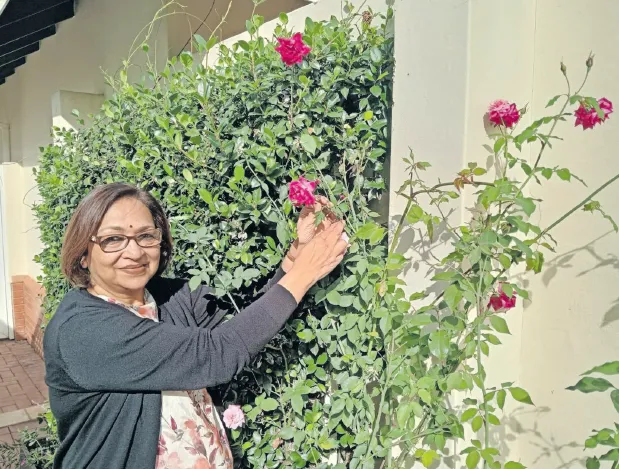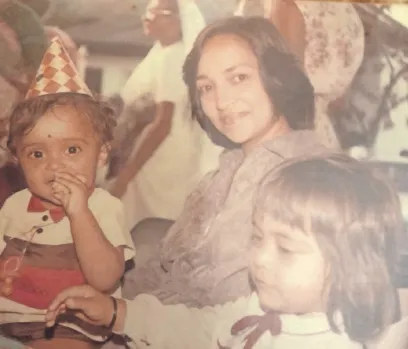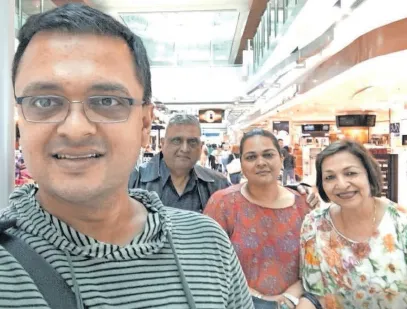Mom’s inspiring story of raising deaf children
From ‘mourning’ for her two children who were diagnosed as deaf, to ensuring that they would achieve success as adults, Nayantra Kanaye, the deputy president of the KZN Blind and Deaf Society and a former teacher, shared her journey from childhood and motherhood, to retirement.

Nayantra Kanaye, the deputy president of the KZN Blind and Deaf Society, enjoys spending time in her garden.
Image: Nadia Khan
DISCOVERING that both her children were deaf, Nayantra Kanaye felt as if she was “mourning the loss of a loved one”.
However, the 70-year-old deputy president of the KZN Blind and Deaf Society, and a former teacher, said despite the first years being the most difficult, she knew she needed to do everything possible to ensure they had a bright future.
In addition, Kanaye, of Mount Edgecombe, has made a difference to the lives of others, who are also deaf, through various programmes during her career and volunteerism.
Childhood
Kanaye, the second youngest of eight children, was born and raised in Riverside, Durban North. Her family moved to Chatsworth in 1966 due to the Group Areas Act.
“I had one of the best childhoods – growing up in a home filled with love and happiness. We were also quite a large family, and our extended family visited us often. My cousins were always at our home during the holidays.
“We also lived in a closed-knit community where everyone knew one another. My dad, Moolchand Badal, was involved in community work and was a founding member of the Friends of the Sick Association. I remember going with him to visit families in the community at the weekend.
“I also remember watching the Japanese Gardens being built. We played around the area, not realising that people would soon be losing their homes. However, we were among the last families to be moved. My dad fought alongside other residents against this. They fought long and hard – until we had no choice but to leave,” she said.
Education
Kanaye said she completed Standard 5 (Grade 7) at the Sir Kurma Reddy State aided Indian School, before the family moved to Chatsworth.
“The school was across the road from my home. It was not only our place for learning, but also a venue for all community activities such as sporting events and plays.
“The school was also quite full with limited classrooms. Over the years, I remember there were times when we had our lessons under a tree or at our local temple. The classes held at the temple were the most exciting as I got to walk a distance away from my home and chat to my friends. Whenever there were festivals at the temple, we also got to enjoy the food,” she said.
Kanaye said she completed Standard 6 at a primary school in Chatsworth, and then attended Standard 7 at the Chatsworth Number Seven High School in Westcliff.
“We were moved to Havenside, which did not have a high school at the time. However, the following year, Southlands Secondary School opened, which I attended until I completed matric in 1972. My favourite subjects were English and Latin” Further studies and career
Kanaye said she completed a diploma in lower secondary education at the Springfield Teachers’ Training College.
“I initially did my first year of studies at the University of Durban-Westville before completing the other two years at the college. I really enjoyed studying, especially English, and looked forward to becoming a teacher.”
Kanaye said she first taught at a primary school in Chatsworth in 1976.
After a year, she taught at a school in Phoenix.

Kanaye with her children, Sharvedh and Divashya, before finding out they were deaf.
Image: Supplied
Family
She married Dr Krishna Kanaye, a general practitioner in September 1976. He passed away from Covid-19 in August 2020.
Kanaye said shortly after getting married, she fell pregnant with her daughter, Divashya, now 48, and about a year-and-a-half later with her son, Sharvedh, now 46.
“After marriage, we moved to Verulam due to my husband’s work. I began teaching at a school. However, I left work when I was about six months pregnant with my daughter as I was quite ill. I enjoyed being at home with my children. They were healthy and were reaching their milestones. I would never have thought what would come next.
“Divashya must have been about a year-and-a-half when we realised something was not right. She was playing with the TV remote and had turned the volume on full, but did not react. My husband and I took her to a specialist, who confirmed she was deaf,” she said.
Kanaye said at that time, she and her husband felt as if their world had come “crashing down”.
“We were distraught. We didn’t know any people, especially those who were ‘role-models’ that were deaf. We only knew those from the charities we assisted. I was mourning as if I lost a loved one, but it was in fact for my children’s future.
“We then went to Cape Town to get a second opinion, and attend a programme on how to deal with a deaf child, including communication skills. We were encouraged to talk to our children so they could be ‘vocal’. I was told to teach my child, who was profoundly deaf, how to speak, and not use sign language – which would make her lazy.
“At the end of the programme, I was approached by the doctor who said I should also test my son. He was just a few months old, but I did it. He, too, was confirmed to be deaf. I had to take in all of this information, but still remain composed for the sake of my children. But all I wanted to do was cry,” she said.
Return to teaching
Kanaye said she joined the VN Naik School for the Deaf in 1984.
“Both my children were attending the school and I was quite the active parent – assisting where I could. So when the principal offered me a job, I accepted. The school had also introduced sign language, which I wasn't too keen about as I kept thinking about the professionals who said it was for ‘low-functioning’ persons. They always said that success meant a child who could vocalise themselves. However, I soon realised that was not so.
“I remember there was a young man, who was deaf, but was working in one of the departments at a university. I thought to myself, he is deaf but a professional. He came to the school to speak about sign language . After that, I can say he made me completely change my mind about it.”
Moving abroad
Kanaye said to give her children the opportunity to further their education, she decided to pursue her Master’s degree in the US.
“My husband and I wanted to make sure they had every opportunity to enable them to become independent. We were not going to let anything hold them back, and that meant also furthering their education. However, at the time there were no tertiary institutions for the deaf in South Africa.
“It so happened that the principal and a teacher at the school had gone to the US to attend Gallaudet University in Washington DC – which is the world’s leading institution for the deaf
and hard of hearing. We decided to visit the university to see if it would be suitable, and it was.
“In 1994, I applied to study at the university to do a Master’s degree in advanced deaf education. Prior to this, I had completed a diploma in special education, and a degree in English and psychology, both through Unisa.
“I also applied for Divashya to be enrolled in the pre-college programme, and for Sharvedh to complete his high school – which was also offered on the university’s campus. This would give them the opportunity to thereafter study at the university,” she said.
Kanaye said after completing the degree, she taught English to foreign deaf students at the university.
“I needed to stay another year as my son needed to still complete his final year of high school.
“At the time, he was my dependant, and would have to return to South Africa with me if I left. So I worked for that year.”
Kanaye said she returned to South Africa while her children completed their degrees at the university.
Divashya completed a BSc in accounting and she graduated magna cum laude. She is currently a professional accountant.
Sharvedh completed a BSc in economics and science. He currently lives in the US and works as an analyst in a department of the federal government.
“In those early days, I cried over my children’s future. I never thought that today, my heart would be filled with so much happiness.
“As a mother, the greatest joy is seeing your children happy and successful. It also shows that nothing is impossible or unachievable when you remain determined.”

Kanaye (far right), with her son, Sharvedh, late husband, Krishna, and daughter, Divashya.
Image: Supplied
Return to South Africa
Kanaye said she was approached to assist with a flagship IT programme for the deaf at the then ML Sultan Technical College in 2000.
“I co-ordinated the programme which meant making sure there were sign language interpreters. I also assisted with the interpreting when needed.
“One of the highlights was seeing the children who were in my form class at the VN Naik School for the Deaf – before I left for the US – join the programme. It was a full-circle moment.”
Kanaye said after 20 years at the college, she retired in January 2020.
Retirement
Kanaye, who serves as the deputy president of the KZN Blind and Deaf Society, said she now enjoyed being involved in its various activities.
“I was always involved with the society, from the time I taught at the school.
“However, when I started assisting at the college, I became a member. Over the years, I have been quite involved, including developing the course and teaching manuals for the sign language classes that the society has every Saturday.
“If I am not doing work with society, I enjoy reading, gardening, cooking or spending time with friends and family,” she said.
Kanaye has submitted her story for volume eight of the coffee table publication, Tell Your Mother’s Story.
The publication, of which Dr Kogielam Archary is the series editor, is part of a flagship programme of the Oral History of South Africa Association.
Related Topics: